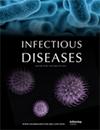Clinical evaluation of a highly multiplexed CRISPR-based diagnostic assay for diagnosing lower respiratory tract infection: a prospective cohort study.
IF 2.3
4区 医学
Q1 INFECTIOUS DISEASES
引用次数: 0
Abstract
OBJECTIVE Accurate and rapid identification of causative pathogens is essential to guide the clinical management of lower respiratory tract infections (LRTIs). Here we conducted a single-centre prospective study in 284 patients suspected of lower respiratory tract infections to evaluate the utility of a nucleic acid test based on highly multiplexed polymerase chain reaction (PCR) and CRISPR-Cas12a. METHODS We determined the analytical and diagnostic performance of the CRISPR assay using a combination of reference standards, including conventional microbiological tests (CMTs), metagenomic Next-Generation Sequencing (mNGS), and clinical adjudication by a panel of experts on infectious diseases and microbiology. RESULTS The CRISPR assay showed a higher detection rate (63.0%) than conventional microbiological tests (38.4%) and was lower than metagenomic Next-Generation Sequencing (72.9%). In detecting polymicrobial infections, the positivity rate of the CRISPR assay (19.4%) was higher than conventional microbiological tests (3.5%) and lower than metagenomic Next-Generation Sequencing (28.9%). The overall diagnostic sensitivity of the CRISPR assay (67.8%) was higher than conventional microbiological tests (41.8%), and lower than metagenomic Next-Generation Sequencing (93.2%). CONCLUSIONS Considering the low cost, ease of operation, short turnaround time, and broad range of pathogens detected in a single test, the CRISPR assay has the potential to be implemented as a screening tool for the aetiological diagnosis of lower respiratory tract infections patients, especially in cases where atypical bacteria or coinfections are suspected.诊断下呼吸道感染的高度复用 CRISPR 诊断测定的临床评估:一项前瞻性队列研究。
目的准确、快速地鉴定致病病原体对于指导下呼吸道感染(LRTI)的临床治疗至关重要。在此,我们对 284 名疑似下呼吸道感染患者进行了一项单中心前瞻性研究,以评估基于高度复用聚合酶链反应(PCR)和 CRISPR-Cas12a 的核酸检验的实用性。结果CRISPR检测的检出率(63.0%)高于传统微生物检测(38.4%),但低于元基因组下一代测序(72.9%)。在检测多微生物感染方面,CRISPR 检测的阳性率(19.4%)高于传统微生物检测(3.5%),低于元基因组下一代测序(28.9%)。CRISPR 检测的总体诊断灵敏度(67.8%)高于传统微生物检测(41.8%),低于元基因组下一代测序(93.2%)。结论考虑到 CRISPR 检测成本低、操作简便、周转时间短、单次检测可检测的病原体范围广,CRISPR 检测有可能被用作下呼吸道感染患者病原学诊断的筛查工具,尤其是在怀疑存在非典型细菌或合并感染的情况下。
本文章由计算机程序翻译,如有差异,请以英文原文为准。
求助全文
约1分钟内获得全文
求助全文
来源期刊

Infectious Diseases
INFECTIOUS DISEASES-
CiteScore
8.20
自引率
1.70%
发文量
92
审稿时长
8 weeks
期刊介绍:
Infectious Diseases (formerly Scandinavian Journal of Infectious Diseases) is a peer-reviewed journal publishing articles on all aspects of human infection, including pathogenesis, diagnosis, and treatment of infectious diseases, and also on medical microbiology and epidemiology
 求助内容:
求助内容: 应助结果提醒方式:
应助结果提醒方式:


